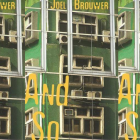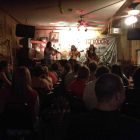Blurbese: “best”
Santa’s not the only one who makes lists in December: come the end of the year, anyone who’s ever expressed a passing literary opinion has their own rundown of the year’s best books.
But book reviewers rarely use these lists as an opportunity to promote the year’s objectively “best” books. Rather, they use them the same way dewy-eyed college freshmen do when posting their favourite books to Facebook—that is, to show off their overflowing coffers of cultural capital. Or, put another way: to make themselves look sophisticated and knowledgeable and cool.
You might object that book reviewers are not so self-centered, but as an occasional book reviewer myself I’m happy to fess up and disagree. Besides, the proof is in the end-of-year-list pudding. I looked at the lists from Publishers Weekly, The New York Times, The New Yorker, The Washington Post, Slate, The Wall Street Journal, Vogue, Entertainment Weekly, and Esquire—which together comprise well over a hundred best book slots in some of the country’s most popular publications.
Out of all those spots, this year’s National Book Award winners featured in just ten—and on some lists they didn’t feature at all. Plenty of space, though, was given to books that received more modest acclaim this year, if they received any at all. Books, in other words, whose “bestness” would not invite large consensus.
Here too, you might object. So what if the National Book Award winners don’t come up that often? They already had their time in the spotlight; the critics are just trying to give some other, underappreciated-but-just-as-good books their time to shine. Besides, aren’t critics allowed to disagree with the establishment? Isn’t that, in fact, part of their job?
Well, okay. But at some point we’re going to have to agree that someone isn’t really telling us what’s “best,” whether it’s the National Book Awards or the book critics—and my money’s still on the critics. Just look how sheepishly Slate’s Matt Yglesias gives us his pick:
It seems dumb to recommend a National Book Award winner, but if there was a better book in 2012 than Katherine Boo’s Behind the Beautiful Forevers: Life, Death, and Hope in a Mumbai Undercity I missed it.
Why is it “dumb” to recommend an award-winning book—the award-winning book—as the year’s best? It’s obvious, to be sure. But it’s only dumb if the point of these lists is not actually to pick the year’s most obvious bests, and instead to wow you with the best books you’ve never heard of—or, more to the point, the best books that the lists’ authors, sophisticated and knowledgeable and cool as they are, have heard of.
And that’s fine, of course. The world could use a few more dewy-eyed freshmen and a few fewer jaded, cynical ones. But next year why don’t we drop the pretence and—here my usual refrain—call a spade a spade?



